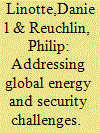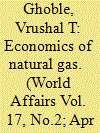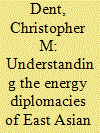| Srl | Item |
| 1 |
ID:
064857


|
|
|
| 2 |
ID:
122811


|
|
|
| 3 |
ID:
188142


|
|
|
| 4 |
ID:
114465


|
|
|
|
|
| Publication |
2012.
|
| Summary/Abstract |
FUEL AND ENERGY COMPLEX is a key economic sector for the absolute majority of countries. It underpins, especially in terms of technology, the level of national security in economic, social and political aspects. Hence the special focus on assurance of energy security by the leaders of many states.
|
|
|
|
|
|
|
|
|
|
|
|
|
|
|
|
| 5 |
ID:
121959


|
|
|
|
|
| Publication |
2013.
|
| Summary/Abstract |
Energy security is one of the major global challenges of the twenty-first century. Intensifying competition for ever scarcer forms of conventional energy resources is causing significant tensions in the international system. East Asia will have a more profound impact on global energy security than any other region as its burgeoning demand for energy fuels, spurred principally by China, is expected to continue growing at over twice the world average in the next few decades. This paper examines the reasons why we may expect the energy diplomacies of East Asian states to become an increasingly salient feature of East Asian states' foreign policy and international relations in the foreseeable future, and thereby significantly shape the nature of the region's international political economy. It presents a framework of energy diplomacy analysis in order to better understand how East Asian states are formulating their energy diplomacy strategies and actions. The four prime elements of this framework comprise: empirical perspectives and generic task-oriented terms; agential influences on the formation and organization of energy diplomacy practice; the energy-development nexus; and transaction mechanisms of energy diplomacy. The main conclusions are first, mercantilist approaches to energy diplomacy will persist but continue to gradually give way to market institutionalism; second, energy diplomacy will become increasingly linked to other forms of diplomacy, such as trade, environment and development assistance; third, we may expect East Asian states to afford greater priority to multilateral energy co-operation both regionally and in a wider international or global sense as energy security interdependencies deepen; and fourth, East Asia's growing reliance on sourcing energy fuels from outside the region will make it more dependent on stable international energy markets-these markets are becoming increasingly internationalized and globalized, which will broaden the future options of East Asian states developing new international energy partnerships.
|
|
|
|
|
|
|
|
|
|
|
|
|
|
|
|